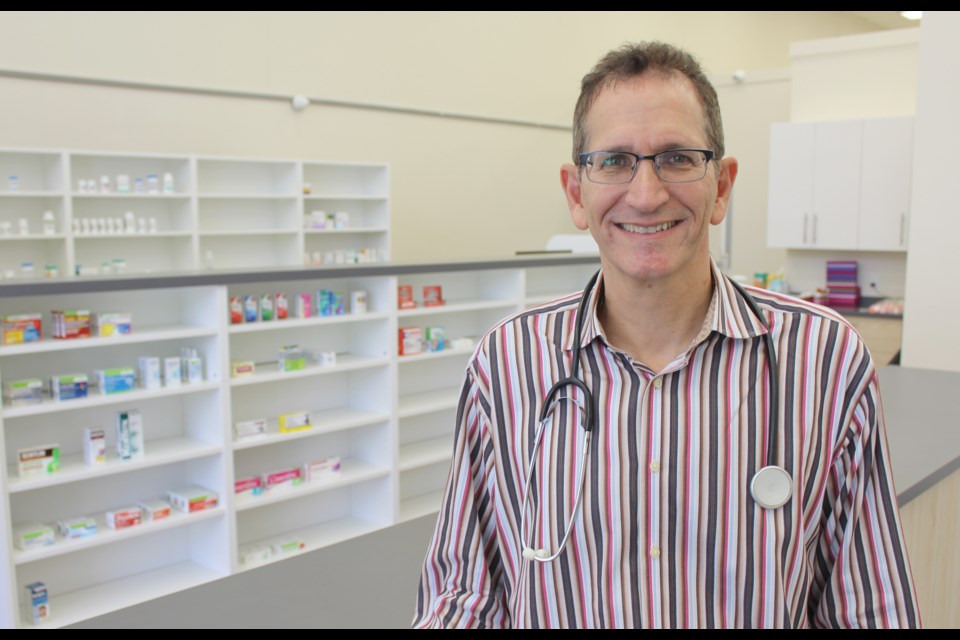As opioid overdoses continue to increase in the area, so do the number of methadone clinics.
The latest one opened Sept. 26 at the busiest intersection in downtown Orillia.
Dr. Robert Cooper moved his clinic from the Downtown Dispensary, at Mississaga and Front streets, to the former Bank of Montreal building – now the Orillia Drug Store – at Mississaga and West streets. The Downtown Dispensary continues to operate as a pharmacy and methadone clinic.
“It’s busy. It’s busy everywhere,” Cooper said. “There’s a reason clinics have opened in pretty much every small town in Ontario. People need help.”
The latest message from police seems to back that up.
“The Orillia detachment of the Ontario Provincial Police is seeing an increase in opioid-related overdoses in the area the Orillia OPP polices,” according to a news release issued last week. “The Ontario Provincial Police would like to remind the public that opioids and their derivatives are often used as a mixing agent within other illicit drugs, putting the public at risk.”
Specific numbers were not available, but it was bad enough to lead police to issue a public warning.
Cooper isn’t surprised. He knows of at least one overdose death in the area that happened in the past couple of weeks.
The problem “really increased a few years ago with increased availability of fentanyl and carfentanil,” he said.
Some businesses near Cooper’s clinics have expressed concerns about its location. Many of those approached by OrilliaMatters did not want to speak on the record about their concerns.
Donald Porter, who owns the Geneva Event Centre next door to the drug store on West Street, said he will be installing two more video cameras now that the clinic has opened.
“They’re going to cause trouble. There’s no question,” he said of the clinic’s clients.
He has seen some of them hanging out in the alley between his theatre and the clinic, “mouthing off” and loitering.
“I’m glad my shows are at night because they would make some of my clientele uncomfortable,” he said.
But the clinic’s location is not his main concern; it’s the form of treatment.
“If (the government) can have this much money going toward maintaining an addiction, they should have enough money to go into treatment centres,” he said, adding that would be a more effective way to “kick the addiction.”
Cooper, who administers methadone and suboxone at his clinic, stands behind his method of treatment.
“The nature of opioid addiction, in the absence of treatment, becomes a chronic, relapsing illness,” he said. “If we maintain people on a long-acting opiate, they can function.”
The opiate curbs certain symptoms without getting the client high, he said, allowing them to go about their day and better maintain friendships and relationships.
“Abstinence programs are great, but they don’t have a (permanent solution),” Cooper said.
Sue Guilherme, owner of Lahay’s Hobby and Crafts, a few doors east of the clinic on Mississaga Street, was “kind of disappointed it opened so close” and that she wasn’t informed ahead of time, but she said she understands the clinic’s purpose.
“He’s a doctor. He’s trying to help people,” she said. “I don’t want to judge people.”
In 2016, the Downtown Orillia Management Board tried in vain to convince city council to ban methadone clinics in the core. Board chair Michael Knight declined comment when contacted by OrilliaMatters recently.
Cooper, who is chair of the Ontario Medical Association’s Section of Addiction Medicine, said his decision to move into the new location, where he treats multiple types of addiction, was due to convenience and space.
“We wanted a bigger, nicer premises to provide better care for people,” he said, noting there is a bigger waiting room, which will encourage clients to wait inside and provide them more privacy. “Given there’s an opioid crisis, we want people to be treated with respect.”
He has watched it become an epidemic since he opened his first clinic in Toronto in 1997.
Cooper had previously worked in a Toronto hospital’s emergency department full-time when his partner took a course on methadone treatment. At that time, there was a two-year backlog of people waiting for it. So, Cooper decided to get into that area of health care, too.
“It was revolutionary at the time,” he said. “The change it provided to people’s lives was invaluable.”
He started his clinic at the Downtown Dispensary in Orillia in the early 2000s and has seen an increase in clients as the opioid crisis has worsened.
It’s important to be in a convenient location because “this is where the people are,” he said.
“We don’t put clinics in places where people don’t need help.”
Cooper doesn’t believe the location of the clinic will lead to a spike in crime in the area.
“Generally, when clinics open, there’s a reduction in crime because people are doing better,” he said. “People have problems everywhere, but it’s not a result of providing treatment for people who need help.”
He invites anyone with concerns to contact him.
More importantly, he said, is his message to addicts: “Come in if you need the help.”
